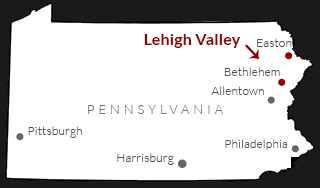Lehigh County Courts
If you have a case pending in the Lehigh County court, you can visit www.LehighCounty.org for the county’s website. On the site you’ll find information on various court offices, individual judges and the legal opinions from cases published by those judges.
The structure of Lehigh County courts is the same as all other counties in Pennsylvania, with the exception of Philadelphia, which has its own municipal court and is structured separately from all other counties in Pa.
If you have a case pending in the criminal courts of Lehigh County, you will primarily be dealing with the following offices:
1) Lehigh County Magisterial District Court judges—These are the magistrate judges, broken up into districts, throughout Lehigh County. The district where your criminal offense occurred is where charges will be filed, filed by the municipal police from that district (or the Pennsylvania State Police).
These judges used to be called “justices of the peace,” and perform a variety of duties, including in criminal cases holding the bail hearing and/initial arraignment of persons arrested, along with the preliminary hearing to determine probable cause on the charges. To learn more about the preliminary hearing process, click here.
2) Lehigh Valley Pretrial Services—This is the county’s bail agency. When a person is arrested and in police custody, he should be brought before a magistrate judge to be arraigned and set bail. For more information about bail, click here.
Private bail bondsmen agencies are also available in Lehigh County, but for a variety of reasons, persons posting bail may choose to use the county’s bail agency, Lehigh Valley Pretrial Services, which oversees those who are permitted to post a 10% bail bond in Lehigh County. Pretrial Services also oversees supervision on bail of those may have posted bail with a private bail bondsman but who are required to be actively supervised, under terms that can be set by the magistrate.
Conditions of bail that Pretrial Services would commonly oversee are things like regular and random urinalysis, drug or alcohol treatment in an inpatient or outpatient setting, mental health evaluations and inpatient or outpatient services.
3) Clerk of Courts— This is the office that maintains official court files and accepts filings of all documents by both attorneys and unrepresented persons. The website for the county listed above has the filing fees for the clerk of courts posted, so that you know how much you have to pay before filing something with the court.
As a general rule, if a criminal case is already pending with an open court file, you don’t need to pay a fee to file a petition or motion (i.e. a motion for bail reduction or motion for work release, as some examples). If there was an open criminal case, but the matter has been closed, there may be certain filing fees, such as filing a Petition to expunge a criminal record.
If you are indigent (no income/low income), you may be able to qualify to file certain things for free, with no filing fee, but you would have to demonstrate your income levels before you’d be considered eligible. In my experience, it’s usually only inmates in a prison that can reach this level of indigency in order to have all filing fees waived.
4) Lehigh County Sheriff’s office—The sheriffs in Pennsylvania are the law enforcement entity that transports prisoners, guards courtrooms and courthouse, serves subpoenas, restraining orders, seizure of firearms under court order, deals with bench warrants (warrants for failure to appear for a scheduled court date), and many other functions. They do not actively investigate criminal activity—this is left to police departments.
If you have an open criminal charge for which you have never answered and would like to “turn yourself in,” this process may require answering to the local magistrate, the sheriff’s office in the county courthouse, or the relevant police department. If you are in this situation, it’s best to retain a local criminal defense attorney who is familiar with the process in that county.
The attorney can usually make arrangements to smooth the road for you, and potentially arrange for you to be “processed” with the court and released, while the case is pending in the court system (as opposed to sitting in prison with no ability to post bail).
5) District Attorney—In Lehigh County (and surrounding counties), the District Attorney’s office is the chief prosecuting office for the county. The concept of “prosecutorial discretion” means that the police and district attorney have the discretion of whether and when to file criminal charges against someone.
The District Attorney’s office in Lehigh County is located on the 3rd floor of the courthouse and works with police and crime victims to bring forward cases in the courts of Lehigh County. When police officers or departments are unsure as to whether a case can or should be pursued in the criminal courts, they look to the District Attorney for guidance, and it is the District Attorney who has the final say on which charges, if any, can be filed, as well as proven, in a Court.
Major cases involving felony charges almost always involve oversight of a district attorney with the police before police decide which charges to pursue. Likewise, withdrawal of charges normally requires approval of the district attorney.
Although I have had many jury trials and contested hearings against various district attorneys in Lehigh County, generally my relationship is amicable with their office, as in many instances, my client is not seeking to challenge his or her case, but rather to find a compromise. This process requires that defense attorneys keep lines of communication open with the district attorney’s office and try to negotiate first—many cases do not need a declaration of war, but rather, someone to carefully sift through the allegations and try to find common ground.
If you are charged with a crime or you believe you will be charged shortly and the police or district attorney is attempting to interview you, it is in your best interest to consult an experienced and local criminal defense attorney first because there are many hidden dangers for those who attempt to communicate with law enforcement without legal representation.



